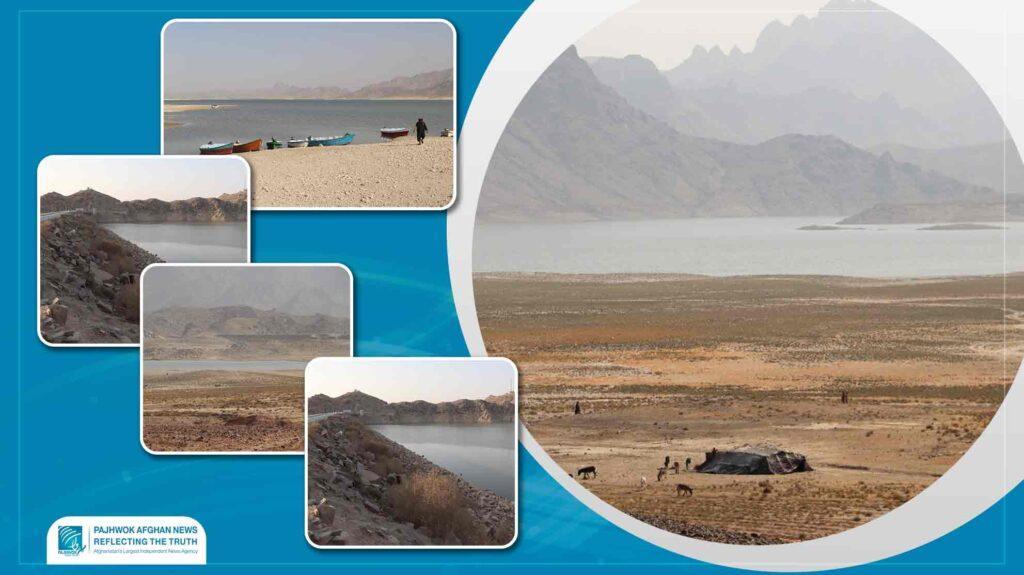
Farmers Urge Desilting Dahla Dam Amid Water Shortage
KANDAHAR CITY (Pajhwok): A number of farmers in southern Kandahar province say the water level in Dahla Dam has sharply decreased due to heavy sedimentation and lack of rainfall, severely affecting agriculture and orchards.
They urged the government to take measures to desilt the reservoir and raise the dam's walls.
Constructed in 1952 with financial support and technical assistance from the United States on the Arghandab River, the Dahla Dam irrigates farmlands and orchards in Kandahar City - the provincial capital - and seven districts: Shah Wali Kot, Dand, Zheri, Daman, Panjwai, Arghandab and Maiwand.
Currently, the dam faces the threat of drying up due to rising sedimentation, decreased rainfall and delays in development projects. The water level has dropped to an unprecedented low, making water release technically impossible.
Farmers voice concern
Farmers warn that if there is no rainfall to increase the dam's water level, the districts of Shah Wali Kot, Arghandab, Panjwai, Dand, Zheri, Maiwand and Daman will face acute water shortages in the coming months.
Noor Ahmad, a farmer from Arghandab district, said:“The Dahla Dam no longer has the same storage capacity as before. It is now almost half empty. If there is some seasonal rainfall, a little water may accumulate, but if not, many orchards will face severe shortages next year.”
Abdul Salam, a farmer from Dand district, said that due to the dam's near-dry state, their fields received no irrigation water this year.
“We had to use deep wells at high cost to water our fields and orchards,” he explained.“The dam is now filled with silt and mud. Even when it rains a bit, it fills up quickly, but the water soon decreases. The stored water doesn't last even three months for agricultural use.”
He urged the government to raise the dam's walls to increase its storage capacity.
Similar conditions prevail in other districts, where water shortages have reduced yields and increased farming costs.
Nazir Ahmad, another farmer from Arghandab, said:“Due to water shortages, the harvest of pomegranates, grapes and other crops has significantly decreased. Our orchards depend entirely on Dahla Dam. If it dries up, all our cultivation will be lost because not everyone can afford to dig deep wells, and groundwater levels are already very low.”
Residents of the provincial capital warn that the dam's complete drying would have devastating consequences for Kandahar and surrounding areas.
Gul Ahmad, a resident of 3rd police district of Kandahar city, said:“The Dahla Dam is considered Kandahar's lifeline. If it dries up, it will not only harm farmers but cause a major crisis for the entire province. Tens of thousands will lose their livelihoods and migrate to the city. It's better to act now before it's too late.”
Farmers pledge financial support
Some farmers say that the dam's elevation work should start as soon as possible, and they are willing to contribute financially.
Haji Pahlawan, a farmer from Arghandab, said:“We have held meetings with farmers from various districts and agreed to contribute financially to the project. Each farmer is currently paying 300 afghanis per half an acre of land and some are paying more. Although the amount is small, it can make a difference when combined.”
Abdul Rauf, another farmer from Dand district, confirmed that after repeated appeals, officials agreed to accept voluntary contributions from farmers for the dam's improvement.
Experts: Dahla Dam no longer meets Kandahar's needs
Eng. Noorullah, a former employee of the Kandahar River Basin Department, said the province's population has grown significantly and agriculture has expanded, making the dam's current capacity insufficient.
“The dam has become silted up, and several decades have passed since its construction. It can no longer meet the irrigation needs of the districts it was originally designed for. During the former republic, there was a plan to raise the dam's basin by 13 metres, increasing its storage capacity from 300 million cubic metres to 800 million, but the plan was never implemented due to political changes.”
Khairullah Rasooli, a technical adviser at the Kandahar River Basin Department, told Pajhwok that efforts were ongoing with the relevant ministry to raise the dam and increase its water storage capacity.
“We carry out maintenance of the dam's gates and other sections every year. Plans exist to raise its height and discussions are underway with the ministry to determine how and by how much it should be elevated to store more water,” he said.
He added that he did not have precise information about when the practical work would begin.
kk/ma

Legal Disclaimer:
MENAFN provides the
information “as is” without warranty of any kind. We do not accept
any responsibility or liability for the accuracy, content, images,
videos, licenses, completeness, legality, or reliability of the information
contained in this article. If you have any complaints or copyright
issues related to this article, kindly contact the provider above.


















Comments
No comment